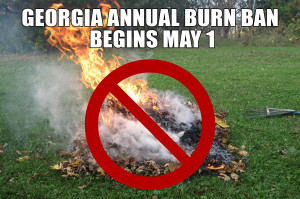FOR IMMEDIATE RELEASE
APRIL 26, 2022
On May 1, an outdoor burn ban will begin in 54 Georgia counties, primarily in the northern half of the state. Affected residents are asked to refrain from burning yard and land clearing debris, whose smoke can negatively impact the state’s air quality during the hot summer months by contributing to high ozone levels. These conditions have been linked to lung and heart disease in humans.
“These restrictions are required by the state Environmental Protection Division so less particulate matter is released into the air,” said Georgia Forestry Commission Protection Chief, Frank Sorrells. “The risk of wildfire is also high at this time, and the Georgia Forestry Commission will be closely monitoring fire activity to keep Georgians and their property safe.”
The burn ban will be in effect from May 1-September 30, 2022. The 54 Georgia counties affected are: Banks, Barrow, Bartow, Bibb, Butts, Carroll, Catoosa, Chattooga, Cherokee, Clarke, Clayton, Cobb, Columbia, Coweta, Crawford, Dawson, DeKalb, Douglas, Fayette, Floyd, Forsyth, Fulton, Gordon, Gwinnett, Hall, Haralson, Heard, Henry, Houston, Jackson, Jasper, Jones, Lamar, Lumpkin, Madison, Meriwether, Monroe, Morgan, Newton, Oconee, Paulding, Peach, Pickens, Pike, Polk, Putnam, Richmond, Rockdale, Spalding, Troup, Twiggs, Upson, Walker, and Walton.
Residents in Georgia counties not included in the annual burn ban will continue to be required to follow specific fire safety guidelines and any local ordinances governing debris burning. The five safety precautions now mandated by law include set spacing between fires and woodlands and structures, burn times from sunrise to sunset, burner attendance at the fire, and reasonable precautions such as weather awareness and suppression tools. Full details including video resources can be found at GaTrees.org/burn-permits-and-notifications/.
“Humans are the number one cause of wildfires in Georgia,” said Georgia Forestry Commission Director Tim Lowrimore. “As outdoor recreation season begins, we need to lower the risk of wildfire by paying close attention to weather conditions and safety precautions. Everyone needs to work together to ensure an enjoyable and fire-free summer.”
For more information about annual summer burn restrictions, burn permits, and services of the Georgia Forestry Commission, visit GaTrees.org.
# # #

I live inNicholson and they’ve been clearing land for weeks and burning trees. Is this allowed?
Thank you for your inquiry.
We will have the unit in your area contact you via the email used to obtain more details to give you the best answer to your question.
Or you may contact the Jackson County (Nicholson, Ga) unit (800-634-8521) for more information.
I live inNicholson and some one has been clearing land up the road for weeks and burning the trees. Can they still do this?
We have a neighbor who burns his garbage and other junk every weekend. He burned last night and we live in a 55 plus. Community where most of our neighbors are sick with cancer or lung disorders or in their 70’s. He lives behind our neighborhood. It was so bad last night I couldn’t breathe and had to use an inhaler.
It is unlawful in Georgia to burn man-made materials such as tires, shingles, plastics, lumber, or household garbage. To report the burning of unlawful material, members of the public may contact their local GFC office to request an EPD Referral. Callers will need to be prepared to provide specific details concerning the burning of unlawful material, which will allow GFC to collect and relay critical information through the referral process to the appropriate EPD District Office.
Just wondering if this burn ban includes Fire pits?
The EPD Summer Open Burning Ban does not specifically prohibit Fire Pits if used for recreational purposes or cooking food for immediate consumption. However, Fire Pits cannot be used during the burn ban to facilitate burning of yard debris (natural vegetation). It will be important for the public to also check their local county/city ordinances since local rules may be more stringent.